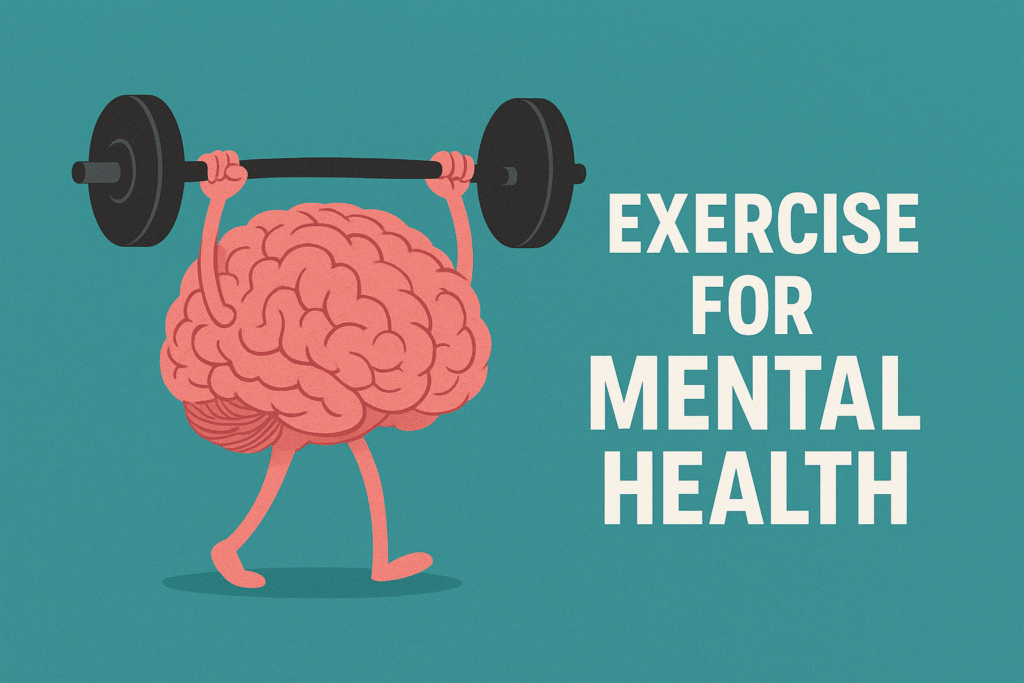Exercise for mental health is one of the most powerful natural remedies for stress, anxiety, and depression. Learn how workouts improve mood, sleep, and focus, and discover the best exercises for mental well-being
Introduction
These days, mental health is one of the biggest challenges many of us face. Stress from work, studies, and daily life can take a serious toll on our mood and energy. While therapy and medication help, there’s also a natural solution available to everyone: exercise for mental health.
The best part? You don’t have to spend hours in the gym to feel the benefits. Just 20–30 minutes of movement a day can completely change how you think, feel, and even sleep. Let’s look at the 7 amazing benefits of exercise for mental health that you simply can’t ignore.

1. Exercise Reduces Stress Naturally
When life gets overwhelming, exercise works like a pressure release valve. Physical activity lowers cortisol (your body’s main stress hormone), helping you feel calmer and more relaxed. A brisk walk or quick workout can instantly shift your mood.

2. It Helps Fight Anxiety
If you struggle with racing thoughts or constant worry, exercise can be a powerful tool. Activities like yoga, running, or strength training release endorphins—chemicals in the brain that act like natural anti-anxiety medicine. Even 15 minutes of exercise can calm your nerves.
3. It Lifts Your Mood and Combats Depression

One of the strongest benefits of exercise for mental health is its impact on depression. Studies show regular physical activity boosts serotonin and dopamine levels, both linked to happiness. In fact, some researchers say exercise can be just as effective as medication for mild depression.
4. It Improves Sleep Quality

Good sleep is essential for mental well-being, but stress often keeps us awake. Exercise helps regulate your body clock, making it easier to fall asleep and stay asleep longer. A consistent routine—whether it’s morning yoga or evening walks—can drastically improve your rest.
5. It Builds Confidence and Self-Esteem
Something is empowering about achieving fitness goals, no matter how small. Whether it’s completing your first push-ups or sticking to a 2-week workout plan, exercise gives you a sense of accomplishment. This confidence spills over into other areas of life, boosting your mental health.
6. It Sharpens Focus and Memory
Struggling to concentrate? Exercise increases blood flow to the brain, improving focus, learning, and memory. That’s why many people feel more creative and productive after a workout. Students and professionals alike can benefit from this brain boost.
7. It Promotes Mindfulness and Relaxation
Workouts like yoga, Pilates, or even mindful stretching encourage you to focus on your breath and body movements. This creates a meditative effect, reducing tension and bringing peace to your mind. It’s exercise and mindfulness in one.

How Much Exercise Do You Need?
The World Health Organization recommends:
- 150 minutes of moderate activity per week (like walking, yoga, or cycling), OR
- 75 minutes of vigorous activity per week (like running or HIIT).
But don’t stress about numbers—what matters is consistency. Even 20 minutes a day can provide long-lasting mental health benefits.
Tips to Stay Consistent
- Start small—10 minutes is better than none.
- Choose workouts you enjoy.
- Exercise outdoors when possible—sunlight is a natural mood booster.
- Track your progress for extra motivation.
FAQs on Exercise for Mental Health
1. Can exercise help with depression and anxiety?
Yes! Exercise reduces stress hormones and increases feel-good chemicals in the brain. Many people notice a big improvement in mood after just a few weeks of regular activity.
2. What is the best exercise for mental health?
There’s no single best option—walking, yoga, strength training, and dancing all work. The key is to pick something you enjoy so you’ll stick to it.
3. How quickly does exercise improve mental health?
Some benefits, such as stress relief, occur immediately after a workout. Bigger changes—like improved mood and confidence—usually show up within 4–6 weeks of consistent exercise.
4. Can too much exercise be harmful to mental health?
Yes, overtraining can lead to fatigue and increased stress. Balance is important—aim for regular, moderate exercise instead of pushing yourself too hard.
Conclusion
Your mental health is just as important as your physical health. The benefits of exercise for mental health are undeniable—it reduces stress, fights anxiety, lifts your mood, helps you sleep, builds confidence, and even sharpens your brain.
The best part? You don’t need fancy equipment or hours of free time. Start small, stay consistent, and enjoy the transformation.
👉 Take the first step today—your mind will thank you tomorrow.



Leave a Reply